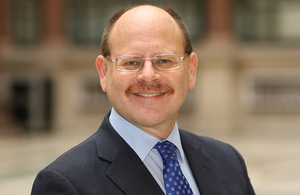Mr Speaker, with your permission, I will make a statement on our continuing fight against coronavirus
and how we intend to fulfil our simultaneous objectives
saving lives, protecting the NHS
while keeping our children in school and our economy running,
and protecting jobs and livelihoods
This morning the Deputy Chief Medical Officer set out the stark reality of the second wave of this virus
the number of cases has quadrupled in the last three weeks
there are now more people in hospital with Covid
than when we went into lockdown on March 23
and deaths are already rising
and of course there are those who say that on that logic we should go back into a full national lockdown
of indefinite duration
closing schools and businesses
telling people again to stay at home as we did in March
once again shuttering our lives and our society
I do not believe that would be the right course,
We would not only be depriving our children of their education
we would do such damage to our economy as to erode our long term ability to fund the NHS and other crucial public services
And on the other side of the argument there are those who think that the patience of the public is now exhausted
and that we should abandon the fight against Covid
stand aside, let nature take her course, and call a halt to these repressions of liberty
and of course I understand those emotions
I understand the frustration of those who have been chafing under the restrictions, the sacrifices they have made
But if we were to follow that course Mr Speaker, and let the virus rip,
then the bleak mathematics dictate that we would suffer not only an intolerable death toll from Covid,
We would put such huge strain on our NHS, with an uncontrolled second spike
that our doctors and nurses would be simply unable to devote themselves to the other treatments
for cancer, for heart disease and hundreds more
that have already been delayed and that would be delayed again
with serious long term damage to the health of the nation
and I am afraid it is no answer to say that we could let the virus take hold among the young and fit
while shielding the elderly and vulnerable
because the virus would then spread with such velocity in the general population that there would be no way of stopping it from spreading among the elderly
and even if the virus is less lethal for the under 60s
there will still be many younger people for whom, alas, it remains lethal
So Mr Speaker, we don’t want to go back to another national lockdown
We can’t let the virus rip
and so we have followed since June a balanced approach with the support of many Members across the House
to keeping the R down
while keeping schools and the economy going
and controlling the virus by changing our behaviour so as to restrict its spread
That is why we have the Rule of Six,
and why we have restrictions such as a 10pm closing time on our hospitality sector.
Mr Speaker, I take no pleasure whatsoever in imposing restrictions on these businesses, many of which have gone to great lengths to reopen as safely as possible.
Nor do I want to stop people enjoying themselves,
but we must act to save lives.
And the evidence shows that
in changing our behaviour
in restricting transmission between us our actions are saving lives.
Left unchecked each person with the virus will infect on average between 2.7 and 3 others
but SAGE assess that the current R nationally is between 1.2 and 1.5.
So we are already suppressing that R to well below its natural level
which is why the virus is not spreading as quickly as it did in March.
But we need to go further.
In recent months, we have worked with local leaders to counter local spikes with targeted restrictions.
But this local approach has inevitably produced different sets of rules in different parts of the country
that are now complex to understand and enforce.
So just as we simplified our national rules with the Rule of Six,
we will now simplify and standardise our local rules
by introducing a three tiered system of local Covid Alert Levels in England – set at medium, high, and very high.
The “medium” alert level, which will cover most of the country, and will consist of the current national measures.
This includes the Rule of Six and the closure of hospitality at 10pm.
The “high” alert level reflects the interventions in many local areas at the moment.
This primarily aims to reduce household to household transmission, by preventing all mixing between different households or support bubbles indoors.
In these areas, the Rule of Six will continue to apply outdoors, where it is harder for the virus to spread, in public spaces as well as private gardens.
Most areas which are already subject to local restrictions will automatically move into the “high” alert level.
As a result of rising infection rates, Nottinghamshire, East and West Cheshire and a small area of High Peak will also move into the “high” alert level.
The “very high” alert level will apply where transmission rates are rising most rapidly and where the NHS could soon be under unbearable pressure without further restrictions.
In these areas the government will set a baseline of prohibiting social mixing indoors and in private gardens
and, I’m sorry to say, closing pubs and bars,
We want to create the maximum possible local consensus behind this more severe local action,
so in each area, we will work with local government leaders on the additional measures which should be taken.
This could lead to further restrictions on the hospitality, leisure, entertainment or personal care sectors.
But retail, schools and universities will remain open.
As my Rt Hon Friend the Chancellor has set out, the government will expand its unprecedented economic support to assist those affected by these decisions,
extending our Job Support Scheme to cover two-thirds of the wages of those in any business that is required to close,
and providing those businesses with a cash grant of up to £3,000 a month, instead of £1500 every three weeks.
We will also provide Local Authorities across England with around £1 billion of new financial support, on top of our £3.6 billion Towns Fund.
And for very high areas, we will give further financial support for local test and trace, and local enforcement
and assistance from the armed forces – not for enforcement but rather to support local services, if desired in the local area.
Mr Speaker, I can report that we have been able to reach agreement with leaders in Merseyside.
Local Authorities in the Liverpool City Region will move into the “very high” alert level from Wednesday.
In addition to the baseline I have outlined, that is as well as pubs and bars, in Merseyside gyms and leisure centres, betting shops, adult gaming centres and casinos will also close.
I would like to put on record my thanks to Steve Rotheram and his colleagues for their cooperation in very difficult circumstances.
Engagement with other leaders in the North West, the North East and Yorkshire & Humber is continuing.
I know how difficult this is – they like, like everyone in the House, us are grappling with very real dilemmas – but we cannot let the NHS fall over when lives are at stake.
So let me repeat the offer that we are making to those local authorities – work with us on these difficult but necessary measures in the areas that are rated very high areas, in return for:
- more support for local test and trace
- more funding for local enforcement
- the offer of help from the armed services
- the job support scheme as announced by the Chancellor
I believe not to act would be unforgivable, so I hope that rapid progress can be made in the coming days.
Regulations for all three Covid local alert levels are being laid today. They will be debated and voted on tomorrow, before coming into force on Wednesday.
We will also keep these measures under constant review, including a four-week sunset clause for interventions in “very high” areas.
A postcode search on gov.uk, as well as the NHS Covid-19 app, will show which local alert level applies in each area
and we are also publishing updated guidance to explain what the Covid alert levels mean for those who are clinically extremely vulnerable.
And while these levels specifically apply to England, we continue work closely with the Devolved Administrations to tackle this virus across the whole of United Kingdom.
Mr Speaker
This is not how we want to live our lives,
but this is the narrow path we have to tread
between the social and economic trauma of a full lockdown
and the massive human and indeed economic cost of an uncontained epidemic
With local and regional and national government coming together
in a shared responsibility
and a shared effort
to deliver ever better testing and tracing, ever more efficient enforcement of the rules
and with ever improving therapies, with the mountains of PPE and the ventilators that we have stockpiled
With all the lessons we have learned in the last few months we are becoming better and better at fighting this virus
and though I must warn the House again that the weeks and months ahead will continue to be difficult
and will test the mettle of this country
I have no doubt at all that together we will succeed
And I commend this statement to the House


